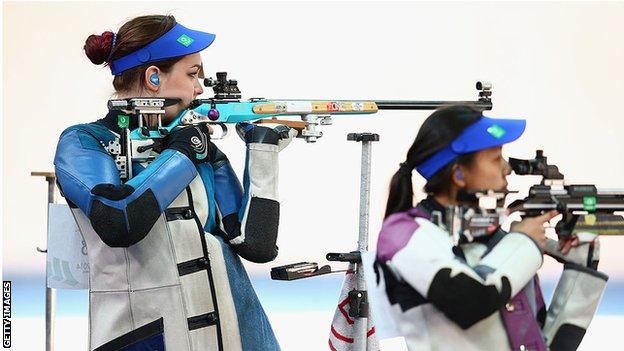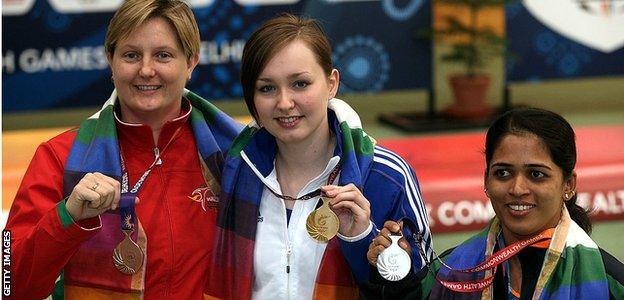Jen McIntosh: Commonwealth gold made shooter question medal pursuit
- Published

McIntosh retired in 2018 having won Commonwealth and European medals
"Waking up the day after I won my individual gold in Delhi, I had that moment of 'Oh, I still have to go on with life'. I always thought of winning the medal as the end and actually it's just the end of the chapter and there's a new chapter after that."
Jen McIntosh's gold at the 2010 Commonwealth Games in Delhi was her crowning achievement, but also a profound moment in her life. At just 19, she had achieved her goal and followed in the footsteps of her mother Shirley in securing the Commonwealth title.
But, lying in her bed in the athletes' village, she began to question the true value of medals for the first time, something which ultimately led to her retirement two years ago at the age of 27.
"When I was younger I had this lovely idealistic view that if I won an Olympic gold medal it would be this life-fulfilling moment and I could die happy essentially," McIntosh says.
"As I grew with experience and age, and changing priorities, I realised it's not that. The sacrifices I had to make became sacrifices I wasn't prepared to make any more.
"There was also the personal cost, which over time took its toll on me emotionally. To be in that constant pressure environment - it is like a pressure cooker. Over time that was becoming harder and harder to deal with."
Enjoying the journey as well as destination
Rather than define her career by the metrics of medals, McIntosh values the journey and the memories made along the way. Asked about her career highlights, she doesn't mention anything that happened on the range.
Instead there was a therapeutic chat with her friends and competitors after shared disappointment at the Rio Olympics, or laughing at her starstruck sister as athletes had lunch with Prince Edward at the Commonwealth Games in Glasgow.
Her view is that medals and accolades never tell the whole story of an athlete's career, nor their personal worth. "The majority of us don't become billionaires or owners of massively successful companies or prime minister," McIntosh says.
"What we define as success, for me, comes with that feeling of not being worthy or valuable. People can add value without winning or being successful in the traditional sense.
"Ultimately, I'd just like to see more narrative around the journey, rather than the end destination."
'It's difficult watching her do things I couldn't'
The dynamic with sister Seonaid - nearly five years her junior - is interesting. McIntosh describes the pair as similarly competitive and driven, while sharing a "geeky" love of science fiction.
But she admits she is driven my her emotions, and is more "impulsive" and "creative" than her sister, who has just finished an engineering degree and is more methodical and laid back.
"I think you can see the difference has played in Seonaid's favour because she's now world number one," McIntosh says. "That careful, considered approach to things has clearly helped her.
"I am driven by my emotions and over time that became too much and too difficult for me to deal with. It's not the only reason she's better than I was but it's clearly a factor."

McIntosh (centre) claimed a gold medal at the 2010 Commonwealth Games, age 19
And there it is, the elephant in the room. It would be easy to say having your younger sister eclipse your achievements is a win for the family but humans are not as straightforward as that.
Seonaid has, after all, won the world and European championships, the 2019 World Cup and is currently ranked as world number one.
"It was obviously difficult at times to watch her achieve things that I never managed," McIntosh says.
"It's a complex emotion and anybody who has a sibling knows that those relationships are always complex, so of course there's an element of - I wouldn't go as far as to say jealousy - but that feeling of 'aw I wish I had been able to do that'.
"But there is a huge amount of love and pride and support with it as well, so it's how you balance those emotions. I personally just take time to process them, just give them space to work through.
"I think part of it is acceptance. Of course there are going to be some mixed feelings in there and a little bit of jealousy, for lack of a better word. And that's fine - it doesn't mean I love her any less."
'Less blood and gore than Game of Thrones'
While Seonaid sets her sights on Olympic success in Tokyo next year, Jen has targets of a different kind. She combines her role of performance and pathways manager for Scottish Target Shooting - the job dad Donald did before her - with writing a fantasy novel with a view to releasing it.
"Maybe less blood and gore than Game of Thrones," she laughs. "That was my first love. I'm a proper little nerd and love my science fiction and fantasy. It was always just an escape for me when I was competing. It's a work in progress at the moment."
Book ambitions aside, McIntosh aims for a "quiet life" after years jet-setting for competitions. Retiring has allowed her to fulfil her dream of moving to the Perthshire countryside, where she lives with her husband, and dog Brego (named after a horse in Lord of the Rings, of course).
Her shooting career may have ended prematurely with some regrets. But one thing's for sure, McIntosh is not the type to let those define her.
"There is that perfectionism and part of me thinking I could've achieved this, that and the next thing, but also I'm happy with my life now and there's not that same level of regret.
"My life is rich and fulfilled and in some ways I'm all the better for not being in that pressure cooker anymore, so you reconcile it that way I think."